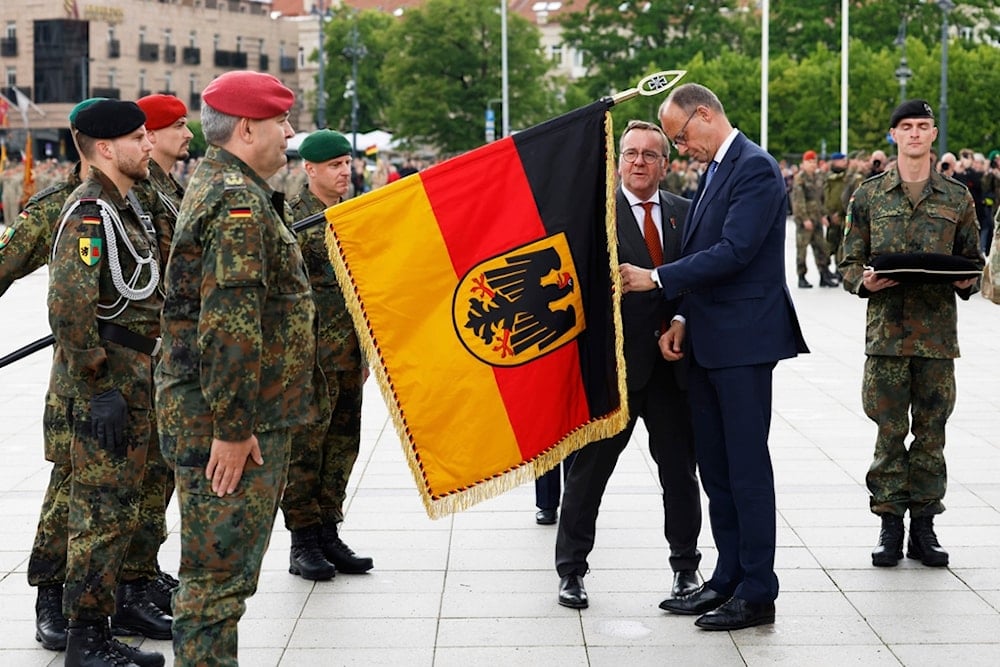Merz backs Taurus missiles for Ukraine but stalls over coalition rift
Although Merz recently confirmed that Germany—along with France, the UK, and the US—has lifted range limitations on weapons sent to Ukraine, thereby enabling Kiev to conduct strikes inside Russian territory, he has not formally backed the delivery of Taurus missiles.
-

German Chancellor Friedrich Merz and German defense minister Boris Pistorius attend a formal inauguration of a German brigade for NATO's eastern flank in Vilnius, Lithuania, Thursday, May 22, 2025 (AP Photo/Mindaugas Kulbis)
German Chancellor Friedrich Merz is reportedly in favor of transferring German-made Taurus cruise missiles to Ukraine but is holding back from a public announcement to avoid deepening tensions within his ruling coalition, The Times reported Tuesday, citing sources close to the chancellor.
Although Merz recently confirmed that Germany, along with France, the UK, and the United States, has lifted range limitations on weapons sent to Ukraine, thereby enabling Kiev to conduct strikes inside Russian territory, he has not formally backed the delivery of Taurus missiles.
Sources familiar with his position say he continues to support the idea internally but fears that going public would trigger a backlash from the Social Democratic Party (SPD), his key coalition partner.
The SPD has long opposed the deployment of Taurus systems to Ukraine, maintaining the same position it held under former Chancellor Olaf Scholz. SPD leaders, including Foreign Policy Spokesperson Ralf Stegner and former parliamentary leader Rolf Mützenich, have called for prioritizing diplomacy over escalation, recently criticizing the lifting of strike range limits.
Defense Minister Boris Pistorius has echoed this caution, arguing there are "many arguments" against providing the missiles.
Strategic Hesitation
The missile system in question, the Taurus KEPD 350, is a precision long-range weapon capable of striking fortified targets at distances of up to 500 kilometers.
Developed by Taurus Systems GmbH, a joint venture between MBDA Deutschland and Saab Bofors Dynamics, the system has been sought by Kiev as a key asset in deep-strike operations against Russian military infrastructure.
Merz has previously said during an interview with ARD in April that the missile transfer remained under consideration, but he stressed the need for consensus: "This should be agreed upon by all European partners."
Read more: Germany open to sending Taurus missiles to Ukraine: Merz
Meanwhile, Russian officials have issued fresh warnings. Foreign Ministry spokeswoman Maria Zakharova warned in April that any strike on Russian territory using Taurus missiles would be interpreted as direct German involvement in the conflict, an assertion that adds diplomatic weight to Berlin's internal hesitations.
Despite growing military support from NATO members, Russia continues to insist that arms deliveries to Ukraine prolong the conflict and represent an expansion of NATO's role. The Kremlin has repeatedly declared that all weapons shipments to Kiev are legitimate military targets.
As the controversy builds, Ukrainian President Volodymyr Zelensky is expected to travel to Berlin for talks with Merz. The future of the Taurus missile deal, and Germany's broader military posture, are expected to be central to those discussions.

 3 Min Read
3 Min Read











